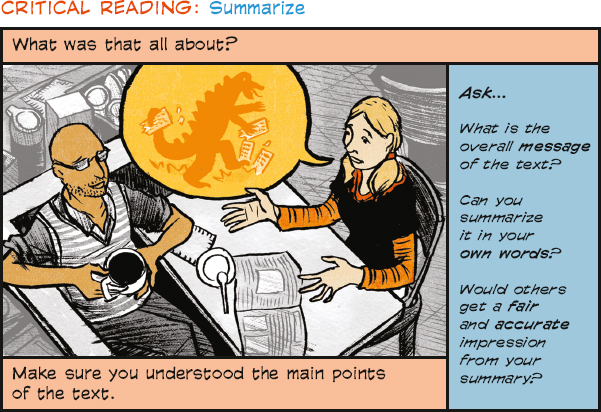12cSummarize the main ideas.
When you feel that you have read and thoroughly understood the text, try to summarize the contents in your own words. A summary briefly captures the main ideas of a text and omits information that is less important. Try to identify the key points in the text, find the essential evidence supporting those points, and explain the contents concisely and fairly, so that a reader unfamiliar with the original can make sense of it all. Deciding what to leave out can make summarizing a tricky task—but mastering this skill can serve you well in all the reading you do in your academic, professional, and civic life. To test your understanding—and to avoid unintentional plagiarism—it’s wise to put the text aside while you write your summary. (For more information on writing a summary, see 17f.)

Go to the Thinking Visually exercise to analyze this image.
Sample summary of an assigned text
A student summarized the article “Is the Internet Warping Our Brains?” (12b) as shown below.
The writer discusses two recent studies, one from 2011 and one from 2008, looking at how Internet use affects a person’s mind. The 2011 study, by psychologist Betsy Sparrow, showed that if a person expects to be able to use Google to get information, then he or she is less likely to remember that information. Sparrow doesn’t see this result as necessarily negative. She hopes that the widespread use of Google might lead educators to focus on “imparting greater understanding of ideas” rather than on “rote learning,” which the writer says has been shown to be a bad way to teach students. (A link explains more about “rote learning.”) The 2008 study, by neuroscientist Gary Small, shows that using the Internet actually activates more of a person’s brain than reading a book. Like Sparrow, Small didn’t draw conclusions about whether Internet use is therefore better or worse for a person’s mind. It’s just different.